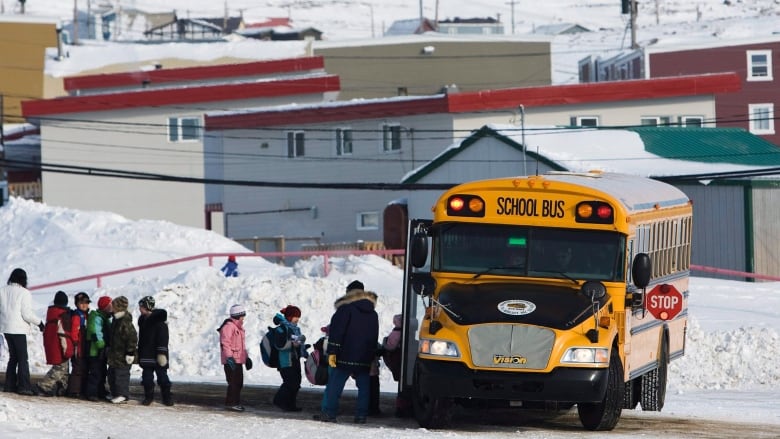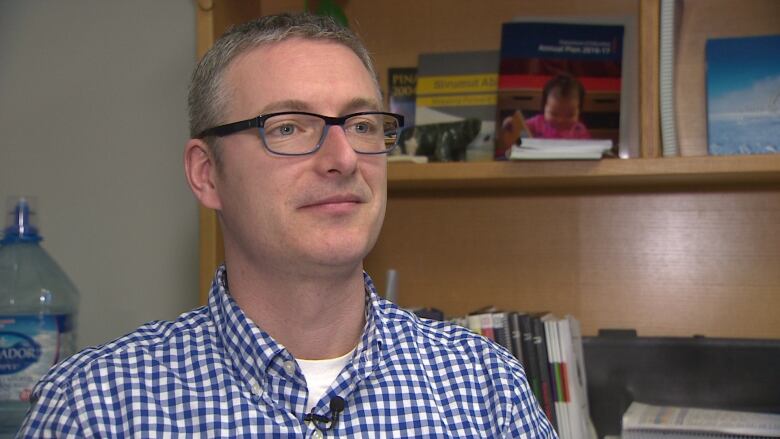Nunavut graduating more high school students, but progress slow
247 students across the territory got their diploma in 2016, compared with 98 in 1999

More Nunavut students got their high school diploma in 2016than in any year since the territory was founded evidence of a long-term trend government officials are hoping to boost.
This past spring, 247 students across the territory graduated from high school.
It'sa significant jump from the 98 students who graduated in 1999, but only slightly higher than the 244 students who graduated in 2009.
"We've seen over the past 13,14 years a steady increase," said John MacDonald, an assistant deputy minister with Nunavut'sDepartment of Education.
"Not large, and not increasing as fast as we would like to see it, but we do see an increase over time."
The new statistics also show some "natural fluctuations" from year to year, said MacDonald, with 2014 and 2015 bucking the upward trend and showing fewer than 210 graduates.
'We want to see more'
At the same time, numbers for overall school enrolment have increased at a much higher rate increasing by about 1,000 students between September 2010 and September 2014.
"I would be more alarmed than I am now if we didn't have that long-term trend working in our favour," MacDonald said.

"The graduation numbers the raw totals are not what we want to see. We want to see more."
MacDonald added that statistics in a territory as small as Nunavut can be misleading, and he doesn't believe enrolment and graduation statistics can be directly compared.
Many Nunavut communitieswith populations in the hundreds, have at times gone several years without a single graduate a phenomenon MacDonald said can be easily explained by the fact that students in Nunavut are more likely to spend longer in high school.
"That's not necessarily a bad thing," he said.
"What you can sometimes see is fluctuations in a year's performance based on the number of students finishing at the same time and that's difficult to predict."
Plans for new schools in Arviat, Baker Lake stalled
That unpredictability can make long-term planning a challenge for the government.
This year, two projects to build new schools had to be put on holdbecause enrolment numbers dropped. The government uses an 85 per cent "utilization rate" to decide which communities need added infrastructure.
It's calculated by comparing the number of students with the school's total capacity.
In the 2012/2013 school year, Baker Lake's Jonah Amitnaaq High School met the government's measurement with a 92 per cent utilization rate.
Last year, it had dropped to 75 per cent and the project was put on hold.Similarly, the government dropped plans to build a new high school in Arviatafter enrolment went down.
During the fall legislative sitting, Education Minister Paul Quassa said the projects will be back on the books as soon as the utilization rates are once again above 85 per cent.
Literacy, safety top priorities
MacDonald says the territory is "working very hard" to keep kids in school and thriving, adding the boost in enrolment statistics is a good sign.
"I can tell you, we spent the last couple of months out across the territory consulting and we heard lots of things good and bad," he said.
"At the end of the day, what people want are results. They want a high number of graduates. And they want those graduates to be immediately successful."
To get there, MacDonald said the government is going to "redouble its efforts" and focus on boosting literacy skills to ensure students are set up to succeed in employment and post-secondary education.
He added that recent student surveys show another of the government's central efforts, building a more positive school environment, is working.
"Kids need to feel welcome," he said. "They need to feel like it's a place that they can learn. And for some students, school is the most safe and welcome place for them."












_(720p).jpg)


 OFFICIAL HD MUSIC VIDEO.jpg)
.jpg)



























































































